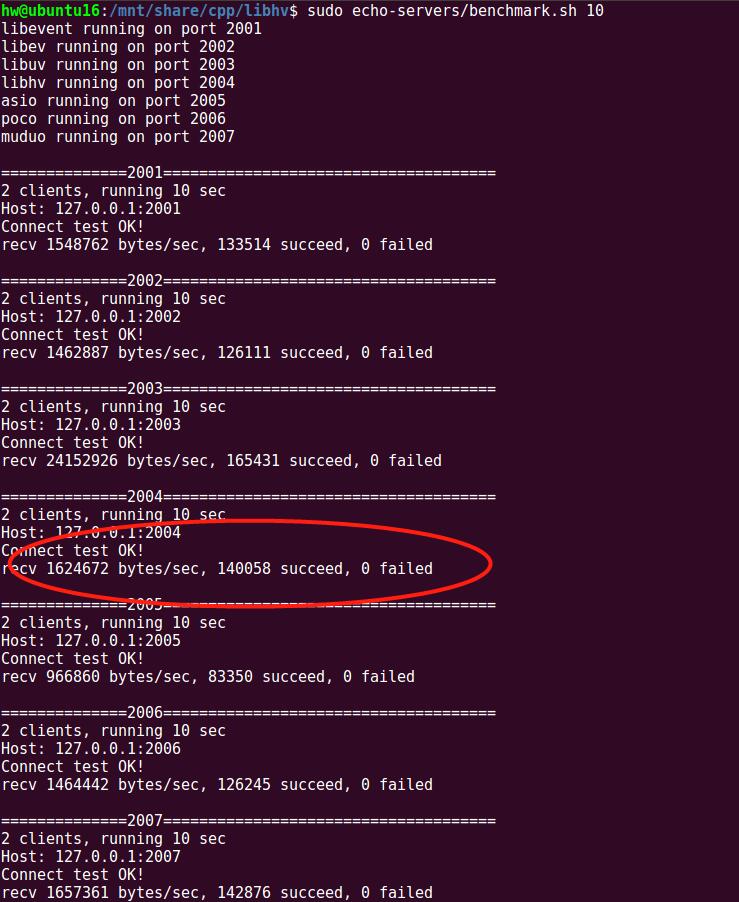Intro
Like libevent, libev, and libuv,
libhv provides event-loop with non-blocking IO and timer,
but simpler apis and richer protocols.
Features
- cross-platform (Linux, Windows, Mac, Solaris)
- event-loop (IO, timer, idle)
- ENABLE_IPV6
- ENABLE_UDS (Unix Domain Socket)
- WITH_OPENSSL
- http client/server (include https http1/x http2 grpc)
- http web service, indexof service, api service (support RESTful API)
- protocols
- dns
- ftp
- smtp
- apps
- ls,mkdir_p,rmdir_p
- ifconfig
- ping
- nc
- nmap
- nslookup
- ftp
- sendmail
- httpd
- curl
Getting Started
./getting_started.sh
HTTP
http server
see examples/httpd/httpd.cpp
#include "HttpServer.h"
int main() {
HttpService service;
service.base_url = "/v1/api";
service.POST("/echo", [](HttpRequest* req, HttpResponse* res) {
res->body = req->body;
return 200;
});
http_server_t server;
server.port = 8080;
server.service = &service;
http_server_run(&server);
return 0;
}http client
see examples/curl.cpp
#include "http_client.h"
int main(int argc, char* argv[]) {
HttpRequest req;
req.method = HTTP_POST;
req.url = "http://localhost:8080/v1/api/echo";
req.body = "hello,world!";
HttpResponse res;
int ret = http_client_send(&req, &res);
printf("%s\n", req.Dump(true,true).c_str());
if (ret != 0) {
printf("* Failed:%s:%d\n", http_client_strerror(ret), ret);
}
else {
printf("%s\n", res.Dump(true,true).c_str());
}
return ret;
}git clone https://github.com/ithewei/libhv.git
cd libhv
make httpd curl
bin/httpd -h
bin/httpd -d
#bin/httpd -c etc/httpd.conf -s restart -d
ps aux | grep httpd
# http web service
bin/curl -v localhost:8080
# http indexof service
bin/curl -v localhost:8080/downloads/
# http api service
bin/curl -v localhost:8080/ping
bin/curl -v localhost:8080/echo -d "hello,world!"
bin/curl -v localhost:8080/query?page_no=1\&page_size=10
bin/curl -v localhost:8080/kv -H "Content-Type:application/x-www-form-urlencoded" -d 'user=admin&pswd=123456'
bin/curl -v localhost:8080/json -H "Content-Type:application/json" -d '{"user":"admin","pswd":"123456"}'
bin/curl -v localhost:8080/form -F "user=admin pswd=123456"
bin/curl -v localhost:8080/upload -F "file=@LICENSE"
bin/curl -v localhost:8080/test -H "Content-Type:application/x-www-form-urlencoded" -d 'bool=1&int=123&float=3.14&string=hello'
bin/curl -v localhost:8080/test -H "Content-Type:application/json" -d '{"bool":true,"int":123,"float":3.14,"string":"hello"}'
bin/curl -v localhost:8080/test -F 'bool=1 int=123 float=3.14 string=hello'
# RESTful API: /group/:group_name/user/:user_id
bin/curl -v -X DELETE localhost:8080/group/test/user/123
# webbench (linux only)
make webbench
bin/webbench -c 2 -t 60 localhost:8080libhv(port:8080) vs nginx(port:80)

EventLoop
see examples/tcp.c examples/udp.c
// TCP echo server
#include "hloop.h"
void on_close(hio_t* io) {
}
void on_recv(hio_t* io, void* buf, int readbytes) {
hio_write(io, buf, readbytes);
}
void on_accept(hio_t* io) {
hio_setcb_close(io, on_close);
hio_setcb_read(io, on_recv);
hio_read(io);
}
int main(int argc, char** argv) {
if (argc < 2) {
printf("Usage: cmd port\n");
return -10;
}
int port = atoi(argv[1]);
hloop_t* loop = hloop_new(0);
hio_t* listenio = create_tcp_server(loop, "0.0.0.0", port, on_accept);
if (listenio == NULL) {
return -20;
}
hloop_run(loop);
hloop_free(&loop);
return 0;
}make tcp udp nc
bin/tcp 1111
bin/nc 127.0.0.1 1111
bin/udp 2222
bin/nc -u 127.0.0.1 2222
make hloop_test
bin/hloop_test
bin/nc 127.0.0.1 10514BUILD
lib
- make libhv
- sudo make install
examples
- make examples
- make tcp # tcp server
- make udp # udp server
- make nc # network client
- make nmap # host discovery
- make httpd # http server
- make curl # http client
unittest
- make unittest
compile options
compile with print debug info
- make DEFINES=PRINT_DEBUG
compile WITH_OPENSSL
libhv combines OpenSSL perfectly, something almost all asynchronous IO network libraries don't do.
And enable SSL in libhv is so easy, just only two apis:
// init global SSL_CTX, see base/ssl_ctx.h
int ssl_ctx_init(const char* crt_file, const char* key_file, const char* ca_file);
// enable ssl, see event/hloop.h
int hio_enable_ssl(hio_t* io);
https is the best example.
sudo apt-get install openssl libssl-dev # ubuntu
make clean
make libhv httpd curl WITH_OPENSSL=yes
# editor etc/httpd.conf => ssl = on
bin/httpd -d
bin/curl -v https://localhost:8080
curl -v https://localhost:8080 --insecure
compile WITH_CURL
- make WITH_CURL=yes DEFINES="CURL_STATICLIB"
compile WITH_NGHTTP2
sudo apt-get install libnghttp2-dev # ubuntu
make clean
make libhv httpd curl WITH_NGHTTP2=yes
bin/httpd -d
bin/curl -v localhost:8080 --http2
other options
see config.mk
echo-servers
make libhv
make webbench
# ubuntu16.04
sudo apt-get install libevent-dev libev-dev libuv1-dev libboost-dev libasio-dev libpoco-dev
# muduo install => https://github.com/chenshuo/muduo.git
make echo-servers
sudo echo-servers/benchmark.shNote: The client and servers are located in the same computer, the results are random, for reference only. In general, the performance of these libraries are similar, each has its own advantages.
